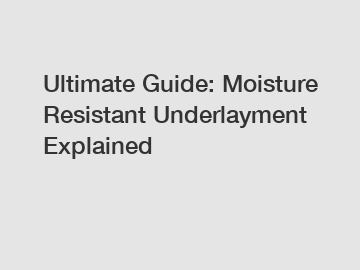Ultimate Guide: Moisture Resistant Underlayment Explained
Ultimate Guide: Moisture Resistant Underlayment Explained.
Moisture-resistant underlayment is an essential component in flooring installations, especially in areas prone to high moisture levels. It acts as a protective barrier, preventing water damage and preserving the overall integrity of the floor. In this ultimate guide, we will delve into the importance, benefits, and the process of choosing the right moisture-resistant underlayment for your flooring needs.
The Need for Moisture-Resistant Underlayment.

Moisture-related issues are a common concern when it comes to flooring installations. Excessive moisture can seep into the flooring material, causing warping, swelling, and even mold growth. This not only compromises the durability of the floor but also poses health risks to occupants. In order to ensure a long-lasting and safe floor, it is crucial to address these moisture-related concerns right from the base.
Choosing the Right Moisture-Resistant Underlayment.
Selecting the right moisture-resistant underlayment begins with understanding your specific flooring requirements. Different types of flooring, such as laminate, engineered wood, or vinyl, may have varying moisture resistance needs. Additionally, the level of moisture in the area where the floor will be installed also plays a role in choosing the appropriate underlayment.
First and foremost, it is essential to check the moisture levels of the subfloor. This can be done using a moisture meter, which will provide accurate readings. Once the moisture levels are determined, it is vital to select an underlayment with a moisture barrier that matches or exceeds the moisture levels of the subfloor. This will effectively prevent any moisture from penetrating the flooring material.
The Benefits of Moisture-Resistant Underlayment.
Investing in moisture-resistant underlayment offers several advantages. Firstly, it provides an extra layer of protection against moisture, ensuring the longevity of the floor. This is particularly important in areas with high humidity or moisture, such as bathrooms, kitchens, or basements.
Secondly, moisture-resistant underlayment acts as a sound and thermal barrier, enhancing the overall comfort of the floor. It reduces the transmission of noise and helps to maintain the desired indoor temperature, thus reducing energy consumption.
Moreover, the use of moisture-resistant underlayment can contribute to the prevention of mold and mildew growth. By acting as a moisture barrier, it impedes the growth of these harmful microorganisms, ensuring a healthier living environment.
In conclusion, moisture-resistant underlayment is a vital component in flooring installations, offering protection against moisture damage, sound insulation, thermal benefits, and mold prevention. By carefully selecting the appropriate underlayment based on your specific needs and the moisture levels of the area, you can ensure a durable, comfortable, and healthy floor. So, make the right choice and safeguard your flooring investment!
Are you interested in learning more about Cement Based Self-Leveling Compound| High Performance, Self-Leveling Compound Manufacturer, Gypsum Self Leveling Compound Supplier? Contact us today to secure an expert consultation!


